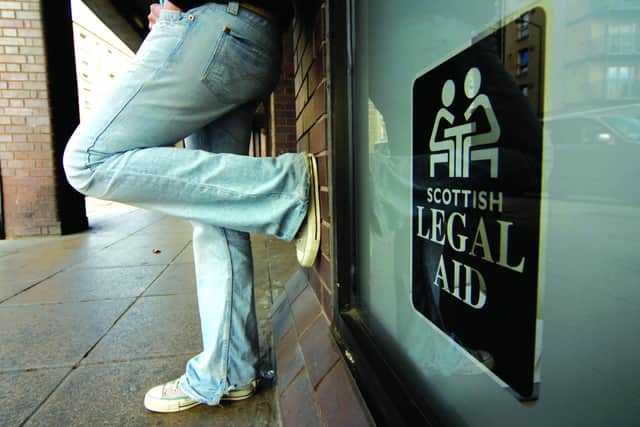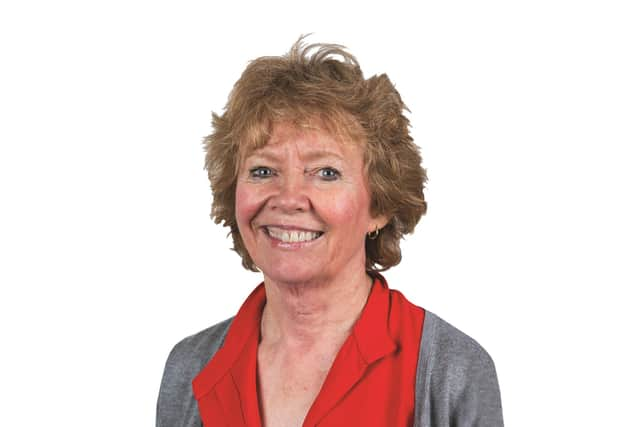Legal review: Grim picture of crisis in vital system
Put simply, there is not enough legal aid funded help available for people who need it, and, according to the Law Society of Scotland, the situation is getting worse, with the poorest and most vulnerable at risk of further disadvantage.
In civil cases, thousands of Scotland’s most deprived families are facing the prospect of representing themselves in court thanks to a chronic shortage of legal aid firms.
Advertisement
Hide AdAdvertisement
Hide AdNew analysis by the society shows that of the 139 most deprived communities in Scotland, there are no civil legal aid firms at all in 122.


A campaign by the Law Society has been launched, encouraging constituents to contact their local MSPs to protest the situation. Legal aid funding from the Scottish Government, agreed in 1999, has only increased by 10 per cent in the intervening years, compared to an inflation increase of 55 per cent.
The Scottish Government recently proposed an £11 million increase in spend across both criminal and civil legal aid.
Patricia Thom, who practices in Galashiels, is the convener of the Law Society’s civil legal aid committee and has been part of the team who has been negotiating with the Scottish Government.
She explains: “The figures are quite startling. We have had no real increase for at least 23 years and although this year we have seen a further tranche of funding it is a drop in the ocean against the generations of underfunding.


“The result is that firms have just stopped offering legal aid because it is too difficult for them to make a living.
“Young people who are recently qualified are not attracted in, and the situation has gone on for so long that even if the Scottish Government were to properly fund the system now, with a huge increase of money, it would take years to recruit the numbers needed because there has been this generational drop-off of people gaining experience in the field.”
She says in terms of civil cases, the fall out is geographical deserts around the country where finding a legal aid representative is almost impossible. “I’m in the Borders and it is difficult here, but the Highlands are also under-represented.”
Advertisement
Hide AdAdvertisement
Hide AdThom believes that often it is society’s most vulnerable that are being adversely affected by the underfunding.
“The issue is that people don’t know how awful the situation is until they actually need legal aid. There are some very common situations that people can find themselves in which will be severely hampered by the lack of representation.
“If you are a parent with a disabled child, for instance, once that child reaches adulthood, you can’t make any decisions on their behalf unless you have legal guardianship.
“To get that, you have to go to court and – if you can’t find a legal aid lawyer to help – it might hold up the whole process. In the meantime, no decisions can be made on their behalf, they can’t get respite care, and so it can be really critical.”
Thom points to a similar situation with elderly relatives who become unable to make decisions with any independent agency: “Families find themselves in difficult and complicated circumstances through no fault of their own, and have nowhere to turn for help if they can’t pay.”
Custody is another area where legal aid is crucial. But, Thom explains: “For someone to have to stand up in court by themselves and face opposing council is so difficult – and the outcome is much more likely to be unfair. It is shocking how eroded access to justice has become.”
The shortage of firms offering legal aid is also felt in criminal justice, according to Ian Moir, convener of the criminal side of the Law Society’s legal aid committee.
He says: “You don’t have to go very far outside the Central Belt to encounter problems in finding a legal aid representative. I believe there are no lawyers offering such work in Campbeltown, which is a sizeable area, very little in Orkney and Shetland, and right across the Highlands.”
Advertisement
Hide AdAdvertisement
Hide AdHis Glasgow-based firm, Moir and Sweeney Litigation, is now one of the bigger legal aid providers, but he agrees that making a living in a legal aid field is hard. “Recruitment and retention is exceptionally difficult. Young lawyers are told in university not to go into legal aid and, even if they have an interest in court work, they can be offered £20,000 a year more than the defence can afford to pay through legal aid, plus better holidays, flexitime.
“They don’t get called out to attend police interviews in the middle of the night and they don’t have to work weekends, so it is no wonder that they are not interested.”
Moir continues: “Every month there are more and more experienced people leaving – which means there are fewer around to teach the next generation how to do the job properly.” He says that this will have a knock-on effect in years to come. “This generation will go on to become the next generation of sheriffs, defending councils and prosecutors in the High Court, so the whole experience of working with legal aid clients could be missing in future.”
An added problem is that in some criminal cases – unlike civil cases – there are situations where the accused is not allowed to act for themselves. Moir explains: “You cannot represent yourself, for example, in a sexual assault case – so if the accused cannot find a legal aid lawyer, the system will grind to a halt.
“We are already finding it extremely difficult to find representation for serious sexual cases in the High Court. That is no use for the complainant, the defendant or for society.”
The eventual outcome, Moir says, is a huge concern. “Worryingly, if you look at the responses to the justice committee about their proposals to freeze the justice budget for the next few years, the suggestion is that the only way ahead is to drop around 25 per cent of cases out of the system.
“Not because they don’t deserve to be prosecuted, but because there is no money to prosecute them.”
He is encouraging citizens to contact their political representatives to redress the situation.
Advertisement
Hide AdAdvertisement
Hide Ad“People assume ‘I don’t do anything wrong, so it doesn’t affect me, I’ll never need legal aid’. But that is to assume that you will never be wrongly prosecuted, and that is all the more reason to find an experienced defence lawyer to fight your corner.”
Simply put, Moir believes that if there is no more money for legal aid then the whole system is on the verge of a meltdown. He says: “The latest tranche of money from the Scottish Government will stave off the effects of inflation for one year and only get us back to the point where we drastically need investment in legal aid.
“Of course we welcome it, rather than nothing, but it is not enough to solve any of the problems for the short and medium term, and longer.
“The new money will just hold us where we are for a year, and where we are isn’t anywhere near good enough to achieve the quality of justice system that Scotland deserves.”
A Scottish Government spokesperson said: “It is up to legal firms or solicitors to offer services or to take a case on legal aid within an area, and we can’t compel them to do so.
“The decline in the number of legal aid firms reflects, in the main, long-term declines in both criminal and civil case-loads. It points to a need to innovate in the provision of access to legal services.
“The Scottish Government funds a number of law centres who provide advice and representation on issues not normally dealt with by commercial firms, as well as localised advice providers who are supported by grant funding from the legal aid fund.
“We also fund public legal services through the Civil Legal Assistance Office and the Public Defence Solicitors’ Office. All of these services can operate across a wide geographic area.
“We are committed to working closely with the profession on reforms to the legal aid system that will improve people’s access to legal services.”